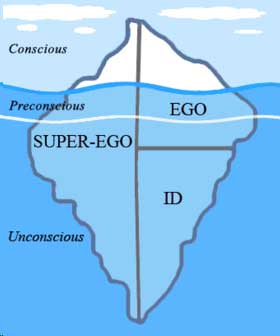(单词翻译:单击)
听力文本
Now, the VOA Learning English program Words and Their Stories!
Each week, we tell about and explain sayings in American English.
Today is it different types of psychobabble.
Psychobabble is a fairly new word in the English language. For about 40 years, people have been using psychobabble to describe the language of popular psychotherapy.
Psychotherapists are specialists in treating mental or emotional disorders. They talk with patients about their problems instead of using medicine or drugs.

Psychobabble can be used in areas other than the world of psychotherapy. Often these words find their way into everyday language.
Sigmund Freud is said to be the father of psychoanalysis. He opened up new ways of thinking about the mind. Freud and his work on unconscious, suppressed desires also led to several new expressions.
Among these is the saying "a Freudian slip." A Freudian slip is something people say accidentally that shows their true feelings. We also call this a slip of the tongue.
Freud explored the feelings that people keep buried deep inside themselves. They fail to recognize they are keeping their feelings hidden. Those feelings are bottled up inside the individual, Freud said. And sometimes these bottled up feelings come out in uncontrolled ways.
Here is an example. In 2004, Condoleezza Rice served as National Security Advisor to the president of the United States, George W. Bush. She was unmarried at the time and there were reports that she spent much of her time with the president and his wife Laura.
At a dinner party one night, Rice was talking with a group of people. She reportedly said, "As I was telling my husb—as I was telling President Bush ..." Some reporters wrote that Rice's Freudian slip might have shown how she really felt about Bush.
Sigmund Freud also defined parts of the human mind. In Freud's thinking, a mind is divided into three parts.
The ego is the part of the mind that senses and reacts to changes in the real world. The superego is the part that relates to ideas about what is right and wrong and to feelings of guilt. The id is the part of our unconscious minds that relates to one's basic needs and desires.
Of these three parts, it is the ego that is used in common expressions. If someone is said to be on an ego trip, they are only thinking of themselves. We also use this expression as a verb, saying that someone is ego tripping.
To stroke someone's ego is to praise them in order to get what you want. For example, if your supervisor is difficult to work with, just stroke his ego. Tell him he has the best ideas and that you are learning a lot from him!
If this boss is egocentric, all those nice comments just might work. Egocentrics are people who care too much for themselves and not enough about others. Egomania is the state of being egocentric. You could say an egomaniac lives in the state of egomania.
However, an alter ego is the exact opposite of an ordinary personality. In literature, one of the most famous examples of an alter ego appears in the book "The Strange Case of Dr. Jekyll and Mr. Hyde" by Robert Louis Stevenson.
This story became so famous that the saying "Jekyll and Hyde" now means a person who is different in moral character from one situation to the next.
For example, you could say, "She has a real Jekyll and Hyde personality. One minute, she's nice and quiet. The next she is shouting at people and insulting them."
Other personality types have made it out of the doctor's office and into American English. Take a Type A personality, for example. A Type A is said to be aggressive and very competitive.
Researchers started using this expression in the 1950s when they explored the connection between Type A personalities, stress and heart disease. In the 1970s, the term Type A found its way into everyday language.
Type As are often described as overachievers, goal-oriented and driven. Such individuals have a hard time waiting in lines, taking it easy and getting away from work. Their main concern is their career. This may sound bad. But Type A people are actually highly effective in the workplace.
And perhaps people who are a little Type A are also good at learning English.
I'm Anna Matteo.
重点解析
1.be said to 据说是
Life can not be said to be a walk away, but the people who harbor, must always do the preparation for the time to go!
人生不可能是一场说走就走的旅行,但心怀远方的人,一定要时刻做着说走就走的准备!
2.a slip of the tongue 口误,失言
When I watched this lecture, I noticed a slip of the tongue.
当我看这节课的视频,发现了讲错的地方。
3.good at doing sth 擅长做某事
He was not a very clever boy, but Charles was good at doing the things that interested him.
查尔斯并不是个特别聪明的孩子,但只要感兴趣的事情他都做得很棒。
参考译文
这里是VOA学英语《词汇掌故》栏目!
每周我们都会探讨和讲解美语的表达。
今天我们要探讨的是不同类型的心理学呓语。
在英语中,心理学呓语是一个非常新的词。近40年来,人们一直使用心理学呓语来描述流行心理疗法的语言。
心理治疗师是治疗精神或情感失调方面的专家。他们和病人探讨问题而不是给病人使用药物。
心理学呓语也可以用在心理治疗以外的其他方面。通常这些词会出现在日常用语里。
西格蒙德·弗洛伊德据说是精神分析学之父。他创造了针对精神的新思考方式。他在潜意识,压抑欲望方面的研究也产生了一些新的表达。
其中就有短语“失言(a Freudian slip)”。“失言”是指人们一不小心说出了他们真实的情感。我们也称之为口误(a slip of the tongue)。
弗洛伊德探索人们内心深处的情感,人们意识不到的潜在的情感,那些情感被个人封印了,佛洛尹德说。有时候这些被封印的情感会以一种不受控制的方式释放出来。
这里有个例子。2004年,康多莉扎·赖斯担任美国总统小布什的国家安全顾问,她那时未婚,据报道她大部分时间都和总统和总统夫人劳拉待在一起。
在一次晚宴上,赖斯正和一群人聊天。据报道,她说,“由于我正和我老公说——由于我正和布什总统说······”一些记者说赖斯的口误也许表明了她对小布什的真实情感。
西格蒙德·弗洛伊德也定义了人类思维的组成部分。在弗洛伊德的理论里,精神世界被分成三个部分。
自我(ego)部分感知并对现实世界的变化作出回应。超我(superego)部分与是非判断和愧疚情感相关。本我(id)是我们的潜意识部分,关联的是人的基本需求与原始欲望。
三个部分之中,自我是一个常用表达。如果说某人追求自我满足(on an ego trip)意思是他们只想到他们自己。“on an ego trip”也可以用作动词,表达成“某人追求自我满足中(someone is ego tripping)。”
“To stroke someone's ego”意思是表扬某人以得到自己想要的。例如,如果你的上司很难相处,那就吹彩虹屁。告诉他他的主意超赞,而且你从他身上学到了很多!
如果这个老板很自我,那些好听的话也许就有用。自我的人指那些关心自己过多,关心别人过少的人。自负是指一种以自我为中心的状态。你可以说一个自负的人生活在自我陶醉的状态。
但第二自我(an alter ego)与普通人格完全相反。文学里最有名的一个“第二自我”形象出现在罗伯特·路易斯·史蒂文森的作品《化身博士》里。
这个故事太有名以至于现在“Jekyll and Hyde(杰奇和海德)”成了多重人格的代称。
例如,你可以说,“她真是多重人格。前一分钟,她和蔼可亲。下一秒,她对人大喊大叫还出言不逊。”
其他人格类型也从医学专业术语流传进美语里。以“A型人格”为例,A型人格一般被认为具有侵略性且好胜心强。
20世纪59年代,研究者在探索A型人格,压力,心脏病之间的关联时开始使用这个表达。20世纪70年代的时候,“A型人格”这个术语就出现在日常用语里了。
A型人格的人经常被描述为卓越、有目标和有动力的人。排队、休息、不工作,对他们来说会是一种煎熬。他们的主要关注点是他们的事业。这也许听起来很糟糕,但实际上A型人格的人在工作场所的工作效率很高。
也许有一点A型人格的人也很擅长学英语。
我是安娜·马特奥。


